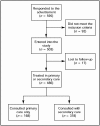A comparison of irritable bowel syndrome patients managed in primary and secondary care: the Episode IBS study
- PMID: 15239911
- PMCID: PMC1324801
A comparison of irritable bowel syndrome patients managed in primary and secondary care: the Episode IBS study
Abstract
Background: It is thought that people with irritable bowel syndrome (IBS) who consult secondary care have more severe symptomatology than those treated mainly in primary care.
Aims: To describe the physical and psychological symptoms of IBS, and the health-related quality of life of patients managed in primary and secondary care.
Design of study: Cross-sectional observational survey.
Setting: The general population of the United Kingdom (UK).
Methods: A cohort of people with IBS symptoms was recruited via a UK-wide newspaper advertisement. Frequency, duration and severity of symptoms, and health-related quality of life data were collected by semi-structured telephone interviews. Descriptive analysis allowed the comparison of those managed in primary care with those consulting secondary care. Logistic regression was used to identify factors associated with patients consulting secondary care.
Results: Data on 486 participants with confirmed IBS (Rome II criteria) were examined. Similar patterns in symptom severity were found in primary and secondary care groups. Factors associated with IBS patients consulting secondary care were: male sex, a longer length of time since diagnosis, having frequent bowel motions, not having dyspepsia in the past 3 months, and having used medication and alternative therapies. Although patients managed in secondary care have greater impairment to their usual activities, both groups had similar health-related quality-of-life profiles.
Conclusion: High levels of physical and psychological morbidity were present in population-based volunteers managed in both primary and secondary care. This study suggests that patients with IBS managed solely in primary care are affected as much as those attending secondary care.
Figures
Comment in
-
Irritable bowel syndrome: management of expectations and disease.Br J Gen Pract. 2004 Jul;54(504):490-1. Br J Gen Pract. 2004. PMID: 15239907 Free PMC article. No abstract available.
References
-
- Heaton KW, Thompson WG. The irritable bowel syndrome (fast facts) Oxford: Health Press; 1999.
-
- Talley NJ, Zinsmeister AR, Melton LJ. Irritable bowel syndrome in a community: symptom subgroups, risk factors, and health care utilisation. Am J of Epidemiol. 1995;142:76–83. - PubMed
-
- Thompson WG, Heaton KW, Smyth GT, Smyth C. Irritable bowel syndrome: the view from general practice. Eur J Gastroenterol Hepatol. 1997;9:689–692. - PubMed
-
- Thompson WG. Irritable bowel syndrome: a management strategy. Baillieres Best Pract Res Clin Gastroenterol. 1999;13(3):453–460. - PubMed
Publication types
MeSH terms
LinkOut - more resources
Full Text Sources
Research Materials
Miscellaneous

